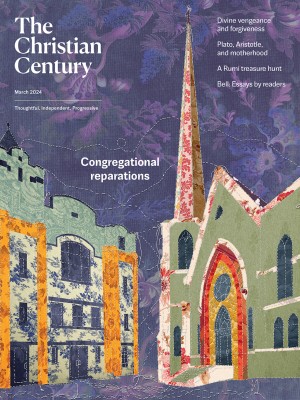March 28, Maundy Thursday (John 13:1–17, 31b–35)
How might the church’s history have been different if foot washing had caught on more widely?
I’ve often wondered if love is somehow less authentic if it is maintained by routine. Stated differently, if one must work for it, plan for it, and schedule it, is love or the demonstration thereof less powerful, less genuine, or simply less real than it would be otherwise?
I’ll admit that this wonder is born of conversations about romantic love and the maintenance of romantic relationships. Do the flowers you send your partner mean as much if they result from the calendar reminder you set? Will they be received with as much joy if your partner knows that your assistant reminds you to order chocolates for them every fourth Friday of the month?
Read our latest issue or browse back issues.
I don’t know if it matters or whether it should, but I do know that love, whether romantic or filial, takes work. As a deacon at my former church would say, “Love is an action word,” and it requires maintenance and precision. More than a feeling, love is a practice. And in offering us this ritual of washing one another’s feet, Jesus leaves a practice of love for us to maintain.
John tells us that when it is clear that the time has come, Jesus loves his disciples to the end. This could mean the end of his life, the end of his time, or the end of his ability. Everything about the mood and tenor of this text suggests that it is all three. With every ounce of energy, every second of time allotted, and every bit of will he has, Jesus loves his disciples. It is not easy, but he loves them anyhow—and the institution of the practice of foot washing gives us an example of how we can continue to love with our all, even until the end.
Foot washing does not have the place within Christian practice that communion does, even though a fair reading of the text might suggest that this is as much an ordained practice as celebrating at the Lord’s table. Though it exists in some denominations, in many churches foot washing is not widely practiced. It is worth wondering how the church’s history might be different if foot washing had caught on. Where might we be in our collective service to the world if a central practice of the church universal were something as humbling as washing one another’s feet?
Jesus gets up from the table, takes off his robe, ties a towel around himself, pours water into a basin, and then washes the disciples’ feet. I’m always struck by the level of detail in this passage. Presumably, the original readers would have known what washing the feet of dinner guests would entail, but for me, this level of detail creates a sense of particularity. Movement by movement, Jesus carefully prepares and then washes his disciples’ feet.
This practice of love that Jesus calls us to is a careful one, one of precision. Might this Maundy Thursday be a day to reflect on what it means to practice love with precision, with the kind of care that allows us to take our time and demonstrate the depth of our love for one another?
A love that endures is the result of discipline, and it takes a real commitment to practice love, to be known by love. Jesus says that this is what we should be known for, our love, and to be known for something takes time, practice, and public witness. This love is bold but also practiced.
As I sit with this text again, I wrestle with the performative nature of love. It’s as if Jesus commands us to perform our love for one another in a way that others will see. The notion of performative love is similar to routine love, because it may call genuineness into question.
But performance isn’t bad; it simply calls for care and heart. The best performances are the most evocative and genuine things we could ever have. Jesus leaves us the example of a routine and performative love that perseveres from the depth of our being into the world. May we perform this Maundy Thursday, with our best rendition of love, and practice it until we get it right.






